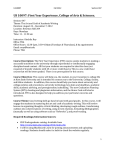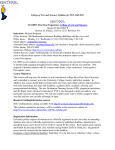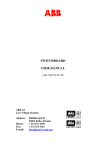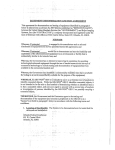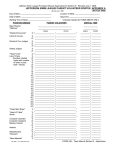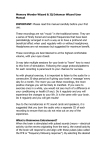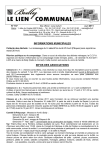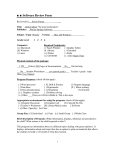Download US 10097: First Year Experience, College of
Transcript
US 10097: First Year Experience, College of Arts and Sciences August 24 – December 7, 2012 Section 40, Day Friday, Time 1:10-2:00, Location 249 Lowry Hall Instructor: Prof. Richard M. Berrong Office location: 304-D Satterfield Office hours: F 12 noon-1:00 p.m. outside 249 Lowry; Monday-Thursday 11:00 a.m.-12 noon virtually, i.e. online Email address: [email protected] Office phone: don’t call; use e-mail Student Success Leader: Sarah Cook Email address: [email protected] Course Description US 10097 assists students in making a successful transition to the university through experiential or intellectually engaging discipline-based content. Required of all first year students. (Not required of transfer students with 25 or more credit hours.) One credit hour. Letter-graded. Prerequisite: none. Course Objectives This course will help you, the student, in your transition to college life at Kent State University and is intended to connect you to the University, College, faculty, and fellow students. In addition, this course should help you learn about university and college policies and procedures, university technology, key dates and deadlines, academic skills, academic advising, and preregistration/scheduling. The new Graduation Planning System (GPS), cheating and plagiarism information, and the Honor Code will also be introduced. FYE is also designed to help you address your particular concerns and questions. Berrong addition: The objective of this course is also to get you to focus on your impressions of Kent State and come up with a way of conveying them other than just through verbal description ("I saw this and felt this way."). Required reading/information sources KSU Undergraduate catalog: available from http://www.kent.edu/catalog/2012/index.cfm Berrong addition: The website for this class is: http://www.personal.kent.edu/~rberrong/Destination/ Per the 2012 Catalog, each Kent State University student is responsible for: 1. Pursuing successful completion of all courses for which he or she enrolls. 2. Meeting with an advisor to develop an academic plan. However, the final responsibility for following procedures and meeting university, college and program requirements as outlined in the University Catalog rests solely with the student. 3. Being familiar with the current academic calendar, including, but not limited to, deadlines for course registration, course withdrawal and application for graduation. 4. Knowing his or her academic record, including registration schedule for each semester and academic progress toward program completion. 5. Maintaining a current and accurate mailing address, phone number and Kent State e-mail address in FlashLine, and reading and responding promptly to all communications from the university. Berrong addition: I realize that Americans your age have largely abandoned e-mail for Facebook, Twitter, etc. The university and your professors have not, however. So, you will need to check your university e-mail regularly for assignments, etc. 6. Being familiar with and adhering to the university’s rules, regulations and policies. Registration Information University policy requires all students to be officially registered in each class they are attending. Students who are not officially registered for a course by published deadlines should not be attending classes and will not receive credit or a grade for the course. Each student must confirm enrollment by checking his/her class schedule (using Student Tools in FlashLine). Registration errors must be corrected by the student prior to the deadline. Dropping a class/withdrawal deadline (for this class): SEPTEMBER 9, 2012 is the last day to withdraw (‘drop’ a class) before a grade of “W” is assigned (on the transcript). Between September 10 and November 4, a student who withdraws from this course will have a grade of “W” assigned (on the transcript). After this point the student is committed to the course and will receive a grade. Important dates and deadlines for students can be found at http://www.kent.edu/registrar/index.cfm Students with Disabilities If you have a documented disability and require accommodations to obtain equal access in this course, please contact the instructor at the beginning of the semester or when given an assignment for which an accommodation is required. Services for students with disabilities at Kent State University are based upon documentation. In order to be eligible, the student must provide verification to Student Accessibility Services (SAS) with a statement from a doctor or qualified psychologist that meets the standards for indicating the presence of a disability, in accordance with Section 504 of the Rehabilitation Act of 1973 and/or the Americans with Disabilities Act. It is the student’s responsibility to provide Student Accessibility Services with this documentation. Services cannot be provided until this documentation is submitted and approved. SAS is found in the DeWeese Center and is available by V/TDD at 330-672-3391. COURSE REQUIREMENTS To successfully pass this course, a student must comply with the following requirements: Attendance: Classes are premised on the KSU policy that regular attendance is expected. If students anticipate an absence, they should consult with the instructor individually. In the event the absence was due to illness or injury, verification from the medical professional treating the illness or injury should be presented to the instructor (KSU Catalog, 2012). Class absence: Legitimate reasons for absence include, for example, illness, death in the immediate family, religious observance, academic field trips, participation in an approved concert or athletic event, and direct participation in university disciplinary hearings. Even though any absence can potentially interfere with the planned development of a course, and the student bears the responsibility for fulfilling all course expectations in a timely and responsible manner, instructors will, without prejudice, provide students returning to class after a legitimate absence with appropriate assistance and counsel about completing missed assignments and class material. Berrong addition: Some students confuse an excused absence with a documented absence. If your mother writes a note saying that you took her to the airport, that is a documented absence and certainly the sign of a dutiful offspring, but it is not an excused absence. In the same respect, if your doctor writes a note saying that you were absent because you went to see her/him for your annual checkup, that is a documented absence but not an excused one. University policy on what constitutes an excused absence can be found at http://www1.kent.edu/policyreg/chap3/3-01-2.cfm. Note especially section D. 3. c.: "Students shall be responsible for all material covered in class during their absence. Students are responsible for completing any makeup work resulting from their absence. In no case is an excuse from class to be interpreted as a release from class responsibility." Students must complete any work missed because of an excused absence promptly. Kent State University has instituted a new advising policy for freshmen and sophomores. Each student must have an advising appointment with a College advisor each semester, in order to discuss academic progress, prepare for course registration and review the GPS Educational Plan. Students must choose either #1 or #2 below to satisfy the required advising policy: 1. Schedule a one-on-one advising appointment with a College advisor in 105 Bowman by the deadline indicated for your group on the Class Schedule below. Note: there are no walk-in appointments. This appointment is made by the student (up to) two weeks prior to the date desired, via the link found on http://www.kent.edu/cas/undergraduate/advising/. Helpful hint: do not procrastinate in making the appointment. Those who wait until the last minute may find there are no appointments available and will not receive credit for the assignment. Keep a copy of the appointment confirmation and get proof of attendance from the advisor. Berrong addition: The Dean writes: “I would recommend breaking up your class alphabetically over the 8 weeks, into four groups (two week periods) and requiring them to make an appointment (which can be done two weeks in advance) over 8 weeks. They will get an email confirmation if they make the appointment on-line, which you can ask to see as proof that they made it. Students who do not schedule an appointment each semester will have a hold put on their registration—this is a new policy.” So that is what we will do. See Class Schedule below. 2. Attend a College small group advising session, scheduled in October (more information to come), prepared to discuss your spring schedule and GPS plan. These sessions are limited and students must pre-register in order to attend. This is not a graded assignment. Students must complete it in order to pass the course. 3. Internet access, in order to complete the On-line learning modules (starting the fourth week of the semester). The “Kent State User Manual” involves a series of six lessons, each about 15 minutes long, that students will complete online. Topics to be covered include university technology, academic advising, policies, procedures, and deadlines, time management, course selection and preregistration, study abroad, self-assessment, and goal-setting. To access the modules, go to https://www.ehhs.kent.edu/stuPortal/lms/advisingMod.php . (Troubleshooting: If you do not know your Flashline user name, please contact the Kent State Help desk at 672-HELP (672-4357)). Modules 1 and 2 should be completed in weeks 4-6; Modules 3 and 4 should be completed during weeks 7-9; Modules 5 and 6 should be completed no later than the final week of the semester. (After this point you will not be able to access the modules.) See attachments for more detail. The due dates for these modules are on the Class Schedule below. This is not a graded assignment. Students must complete all six of these modules in order to pass the course. 4. Completion of one Student Success Series Workshop at http://www.kent.edu/success/programs/success-series.cfm . Successful first-year students at Kent State University are those who learn how to utilize resources, resolve problems, and prepare themselves to take full advantage of their time on campus. The Student Success Series helps to promote this success by offering workshops on the common concerns and questions first-year students have during their transition to university life. Students are asked to register for an offering that is of interest using their FlashLine user name, print the confirmation e-mail, attend the presentation, and submit their stamped e-mail as confirmation to their FYE instructor as proof of attendance. Please see the handout on how to register for a workshop. This is not a graded assignment. Students must complete it in order to pass the course. 5. KSU Faculty Interview: In order to encourage students to make connections with faculty members and assist them with feeling comfortable asking for assistance, students will conduct one informational interview with a faculty member teaching a course in which they are registered this semester. Students should plan in advance to attend office hours or set up an appointment with the faculty member. (Questions and assignment details are provided and attached to the syllabus.) Berrong addition: Note: This must be a member of the full-time faculty, not a graduate student or part-timer. When you set up an appointment with the faculty member, make sure to find out if he or she is indeed a full-time faculty member. Make sure to get them to fill out the Faculty Interview form posted on the class website. Why do I require this? In my decades of college teaching, I have discovered that some students will actually fail a course rather than speak to the professor when they are in trouble. To get you over this hurdle, I’m requiring you to speak to a professor one-on-one, face-to-face. Don’t worry, they are not all as terrifying as I am ;) This is not a graded assignment. Students must complete it in order to pass the course. 6. Presentation of your artistic rendering of your Impression of something that struck you during your first weeks at Kent State. This is a graded assignment. You must complete it in order to pass the class. If you do a poor job, your grade for the course will reflect that. Conversely, if you do a bang-up job on this, your grade for the course will reflect that as well. Additional expectations 1. 2. 3. 4. 5. 6. 7. Academic honesty: University policy 3342-3-01.8 deals with the problem of academic dishonesty, cheating, and plagiarism. None of these will be tolerated in this class. The sanctions provided in this policy will be used to deal with any violations. If you have any questions, please see the Plagiarism website at http://www.kent.edu/academics/resources/plagiarism/index.cfm or read the policy at http://www.kent.edu/policyreg/policydetails.cfm?customel_datapageid_1976529=2037779 . Arrive on time for class and do not leave early. Actively participate in all class sessions and be prepared. Late submission of work: not allowed Missing class: it is the student’s responsibility to approach the faculty instructor about any missed classes, and to obtain any handouts or materials distributed. Respectful Student Conduct: The College follows University regulations regarding student behavior in the classroom. It is expected that each student will be respectful to the instructor as well as to fellow classmates. Use of profanity, rudeness toward fellow students or the instructor, angry outbursts, refusal to participate in classroom activities, repeated tardiness, and leaving the classroom prior to class dismissal are just some examples of disruptive behavior. The instructor will ask the disruptive student to cease and desist and will inform the student of possible suspension and/or dismissal from the class. Guidelines pertaining to class disruptions are outlined in detail in the University Digest of Rules and Regulations. The Code of Student Conduct is available from http://www.kent.edu/emsa/studentconduct/index.cfm . Classroom etiquette: Please be courteous—turn off and put away all electronic devices including cell phones, laptops, and mp3 players. The use of these items is prohibited in the class. Course grading US 10097 is required for graduation. Each student must earn a passing grade in order to complete graduation requirements. Attendance is expected, so you don't get points for it. If, however, you have more than one unexcused absence (see Absences, above, for what constitutes an excused absence), you will fail the class. Since you don't want to have to take the course over again, don't miss class. Participation is another matter. You can sit in your chair all semester and say nothing, which I certainly hope you don't do, or you can contribute interesting things to the class discussion. Since, in principle, you chose this session of US 10097 because the topic was of interest to you, you should have interesting things to say. I can't keep track of every time a student opens his or her mouth; that would kill discussion and be tedious. Suffice it to say, then, that if you don't participate in the class discussions, you won't be able to earn an A, even if you are Picasso or Mozart or Woody Guthrie themselves and produce a knock-out Impressions piece. No, I can't tell you how many things you have to say to get an A. Just talk! Intelligently, of course. Talk is not babble. But remember: you chose this section because it was of interest to you. As you can see above, most of the assignments are not graded. They must be completed in order to pass the class. Your final project, the artistic rendering of your Impression of something that struck you in your first weeks at Kent State, is graded, however. Will I grade you on your talent as an artist? No. You don't have to be Picasso or Mozart or Guthrie to get an A. I'll grade it, instead, on the work that went into it, and the quality of your presentation of it in class to your peers. If you want to see examples of how past students did on this - and they are, most of them, very impressive - you can see them on the class website. NF/SF Grading The NF (Never Attended F) grade denotes that a student never attended one class session nor did the student formally withdraw from the course. The NF grade will count as an F (zero quality points) in computing grade point averages and will appear on the transcript. The SF (Stopped Attending F) grade denotes that a student stopped attending the course and did not formally withdraw. The SF grade will count as an F (zero quality points) in computing grade point averages and must be accompanied by a date of last attendance in the course. Students missing more than two consecutive absences without electronic or verbal communication to the faculty member will receive a grade of SF for the course. CLASS SCHEDULE (Subject to change. Since we can’t afford to pass out new paper syllabuses every time there is a change made, you will want to check the syllabus online regularly.) A college advisor will arrange to visit your course once this semester, approximately the last week in September. Details will be forthcoming. Week 1 (August 24 and 31): Welcome and Overview, Syllabus review Week 2 (September 7) : Kathy Spicer will speak about the Collegiate Learning Assessment (September 9 is the last day to “Drop” a class without a W on transcript) Week 3 (September 14): Group 1 sees College advisor (Mia, Michelle, Em, Meghan, Veronica, Anastasiya); Distribute Student Survey week 3 or week 4 Week 4 (September 21): Group 1 sees College advisor (Mia, Michelle, Em, Meghan, Veronica, Anastasiya); Complete online modules 1-2; Distribute Student Survey week 3 or week 4 Week 5 (September 28): Group 2 sees College advisor (Katherine, Thomas, Zach, Kristy, Peter, Jacqueline); Complete online modules 1-2; Week 6 (October 5): Group 2 sees College advisor (Katherine, Thomas, Zach, Kristy, Peter, Jacqueline); Complete online modules 1-2; Week 7 (October 12): Group 3 sees College advisor (Breta, Kayla, Keila, Lauren, Monica). Complete online modules 3-4. Visit from academic adviser, Matt Minichillo, from the College of Arts and Sciences to talk about the GPS system, required advising policy, group advising workshops, and other information relation to pre-registration for Spring 2013. Week 8 (October 19): Group 3 sees College advisor (Breta, Kayla, Keila, Lauren, Monica); Complete online modules 3-4; Midterm grades for Freshmen starting October 17--Check yours in Flashline under Student Tools. Week 9 (October 26): Group 4 sees College advisor (Maxine, Andrew, Lindsey, Nate, Natasha); Complete online modules 3-4; Week 10 (November 2): Group 4 sees College advisor (Maxine, Andrew, Lindsey, Nate, Natasha); Complete online modules 5-6; draw lots for scheduling student presentations November 4 is the last day to “Withdraw” from a class (Transcript will show a ‘W’) Week 11 (November 9) Complete online modules 5-6; Student presentations: Anna, Veronica, Andrew, Thomas, Jacqueline Week 12 (November 16) Complete online modules 5-6; Student presentations: Meghan, Peter, Lindsey, Kristy, Zach Week 13 : Thanksgiving recess: no class Week 14 (November 30) End of semester course evaluations (SSIs); Complete online modules 5-6; Student presentations: Keila Otero, Katherine, Em, Monica, Breta, Lauren Week 15 (December 7) Last week for this class (FYE does not meet Finals Week, because there is no final exam); Complete online modules 5-6; Student presentations: Natasha, Nate, Maxine, Maria, Kayla Morrison START OF SYLLABUS SUPPLEMENTS for STUDENTS Student Success Series: Fall 2012 Successful first-year students at Kent State University are those who learn how to utilize resources, resolve problems, and prepare themselves to take full advantage of their time on campus. The Student Success Series helps to promote this success by offering workshops on the common concerns and questions first-year students have during their transition to university life. Presentations are provided by experts on the topics who can provide information and guidance. If you are in need to complete a Student Success Series Presentation for your FYE class, you will submit your stamped e-mail confirmation as your proof of attendance to your instructor. The Office of Student Success Programs does not keep attendance records and is not able to provide an attendance list. How do I register? 1. Go to www.kent.edu/success 2. Click on “Register for a Student Success Series “ 3. Search by Topic or Date to research presentations 4. Click on “Register for a Presentation” 5. Enter your Flash ID (KSU email address without the @kent.edu) 6. Select a presentation 7. Click verify 8. An email confirmation will be sent to your Kent email account: PRINT THIS OUT and bring it to the presentation 9. Problems? Contact Meghan Cisar [email protected] How far in advance should I register? Success Series presentations fill up quickly. The sooner that you register, the better chance you have of being able to attend your first-choice sessions. Additional presentations will not be added at the end of the semester to accommodate for FYE assignments. Can I alter my Success Series choice after I am registered? Yes. If you wish to cancel your registration, go to the Success Series web page. 1. 2. 3. 4. 5. Go to www.kent.edu/success Click on “Register for a Student Success Series” Enter your Flash ID (KSU e-mail address without the @kent.edu) Select the presentation that you wish to change Click cancel Why is there a confirmation letter? After you make your Success Series selections, you should print out the confirmation letter and take it with you to the event. Students without a confirmation letter will not be allowed to enter the classroom/auditorium until five minutes before the presentation, and only at the discretion of the presenter and if there is adequate room. What if there are changes to the schedule? There is a possibility that there may be changes to the success series schedule, so students should check the web site for the most up-to-date information. Is it okay if I have to come late or leave early? It is not okay to come to a presentation late or to leave early. Please try to arrive 10 minutes early to the event and plan on staying for the full presentation. If you cannot make the commitment to arrive early and stay for the appropriate length of time, please find a more appropriate session to attend. Your KSU User Manual Online Modules Step 1: Purpose of the advising modules: a supplement to the US 10097 course. The modules are to provide pertinent and important information when you need it most; thus, each module has a recommended time to complete. You should complete the advising modules as indicated by your instructor on your US 10097 course syllabus; otherwise feel free to complete them as needed. Step 2: Getting Started: To access the modules visit: http://www.kent.edu/advising/index.cfm Click on the link for the Advising Modules found on the left column (instructions for use are provided within each module). Step 3: Logging In: In order to receive credit for this lesson, you must enter your Kent State Flashline username in the box below and then click the "Continue to Modules" button below to begin the module. Note: Your Flashline username is the part of your email address before the @ sign. Step 4: Troubleshooting: If you do not know your Flashline user name, please contact the Kent State Help desk at 672-HELP (672-4357). **If you are not able to access the modules, or the link is not working, please email [email protected] Step 5: Introduction: Read the introduction and purpose of the modules and log-in using your FlashLine user name. Step 6: Quiz: Continue to the 6 question pre-test quiz (you must complete these before you can begin the advising modules). Step 7: Complete Modules: Complete each module as recommended by your FYE instructor. Because your progress is not saved between sessions, once you start a module you will need to complete it in its entirety. You will need to complete all of the modules including a post-test survey by the last day of classes or as indicated by your instructor on your US 10097 course syllabus.












